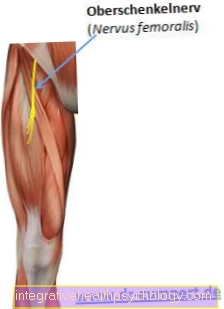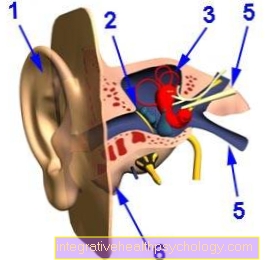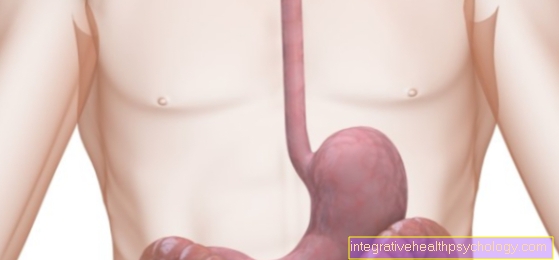Acquired hypothyroidism
Synonyms in the broadest sense
Acquired hypothyroidism, Hashimoto's thyroiditis, autoimmune disease, Inflammation of the thyroid gland, postoperative hypothyroidism, primary, secondary, tertiary hypothyroidism, latent hypothyroidism, myxedema
Also read:
- Hypothyroidism
- congenital hypothyroidism

definition
An underactive thyroid is present if the thyroid produces insufficient amounts of thyroid hormones (T3 and T4). The result is that the hormones do not have any effect on the target organs.
Overall, the thyroid hormones cause an increase in overall metabolism and promote development and growth.
In addition, the thyroid hormones play an important role in controlling the calcium and phosphate balance. In addition, they stimulate protein production (= protein biosynthesis) and the formation of the sugar storage substance glycogen.
introduction
Note: effect of thyroid hormones
The effect and the control loop of the thyroid hormones are explained in the introduction to the topic: Congenital hypothyroidism.
Cause / origin

A distinction is made between primary, secondary and tertiary forms of hypothyroidism.
Primary hypothyroidism
- The underactive thyroid occurs as a result of an autoimmune disease, an inflammation of the thyroid gland (= Hashimoto's thyroiditis). Thyroid cells perish and hormone production is limited.
- Hypothyroidism caused by medical measures is also one of the primary form of the disease. After removal of the thyroid gland (= strumectomy), after radioiodine therapy or due to drug treatment with e.g. Lithium or anti-thyroid drugs can limit the production of hormones by the thyroid gland.
Secondary hypothyroidism
This form is very rare and occurs when the pituitary gland (pituitary gland) can no longer produce TSH and thus the formation of thyroid hormones in the periphery is not stimulated.
Tertiary underactive thyroid
This form of hypothyroidism is also rare. It is caused by the lack of TRH production in the central nervous system, so that the thyroid hormone regulating system no longer works.
Latent hypothyroidism
This form of hypothyroidism does not cause any symptoms in the patient, which is why it is also referred to as a subclinical form (= no detectable symptoms / symptoms in the patient).
It is diagnosed by measuring hormones in the blood: the concentrations of T3 and T4 are normal, the value for TSH is very normal to elevated.
Also read our general article on metabolic disorders: Metabolic Disorder - What does it mean?
Symptoms
Those affected notice you physical and mental decline in performance, have little drive and slow down their movements and thought processes.
The patients are often disinterested in what is happening in the environment, which is also reflected in their facial expressions.
The Sensitivity to cold the patient is increased (= cold intolerance) and their skin is pale, cool, flaky and dry, and the patient's hair is also dry and brittle.
The The patient's heart rate is slowed (= Bradycardia), because the heart is less sensitive to Catecholamines (= Hormones, including adrenaline, for example) that cause an increase in cardiac activity (see Cardiac arrhythmia).
The reflex of the Achilles tendon can be triggered, but it occurs more slowly.
The patients suffer more and more constipation (= Constipation) and have a rough, hoarse voice on.
As the patient's cholesterol levels are increased, the onset of the Hardening of the arteries (=arteriosclerosis) possible.
Affected girls and women can Menstrual Disorders and Infertility to be watched.
Mental symptoms can appear and take the form of depressionShow lack of drive and slowing down.
Patients may take due to a generalized Myxedema in weight too. This myxedema is caused by glycoproteins (= proteins with a sugar residue in the chemical structure) that are stored under the skin. These proteins have an osmotic effect, i. they attract water, which leads to water retention in the body. This results in the weight gain.
diagnosis
The hypothyroidism (Hypothyroidism) is determined based on the clinical symptoms presented by the patient and laboratory tests.
Is the primary form of hypothyroidism before, the concentration of the thyroid hormone T4 in the blood is reduced, while those of TSH and TRH are increased.
In the secondary form on the other hand, the thyroid hormone concentration and the TSH value are decreased, TRH is increased.
In the tertiary hypothyroidism all hormones in the control loop are only available in greatly reduced concentrations.
Is there a Autoimmune disease of the thyroid gland, autoantibodies against an enzyme (= biological catalyst) of the thyroid cells can be detected in 95% of cases. Means Ultrasound examination the thyroid gland and a possible tissue sample can be diagnosed an autoimmune process.
Another diagnostic option is that Scintigraphy:
Here one makes the property of the thyroid gland, iodine to store and incorporate this into the thyroid hormones, to use.
The function of the thyroid gland can be checked by administering a radioactive substance coupled to iodine via the vein:
A strongly reduced or missing storage of the radioactively marked iodine in the thyroid tissue indicates an underfunction of the organ:
Few thyroid cells are active, which is why little iodine is required for the formation of thyroid hormones and is therefore not absorbed into the organ.
Differential diagnosis (exclusion diseases)
An important diagnosis to be distinguished from hypothyroidism is the low-T3 / low-T4 syndrome, in which both the values for T3 and T4 are reduced. This syndrome can occur in critically ill patients in the intensive care unit; in contrast to the underactive thyroid (hypothyroidism), hormone substitution with thyroxine is avoided.
therapy
The therapy of hypothyroidism consists of a permanent replacement (= substitution) of the thyroid hormone T4 (L-thyroxine) and regular check-ups with your doctor.
In the case of pronounced hypothyroidism, the hormone dose should be increased slowly up to the necessary dose, because an overdose of thyroid hormones can lead to Cardiac arrhythmias come.
The optimal dose of hormone administration is determined on the basis of the clinical condition (general condition) of the patient and the value of TSH.
The therapy is successful when the patient is symptom-free and the TSH value is between 0.5-2.0 mU / l.
Complications
The generalized myxedema with water retention throughout the body, including also in the pericardium (=Pericardial effusion), is a serious complication of the underactive thyroid (hypothyroidism) and should be carried out under intensive medical supervision.
It is important that breathing of the patient and to keep the vital parameters (heart rate, blood pressure) stable.
The patient receives infusions with glucocorticoids, glucose and salts (= electrolytes). The replacement of the thyroid hormone T4 also takes place via an infusion (= i.v. administration, intravenous administration).
If the patient is hypothermic, he should be carefully rewarmed.



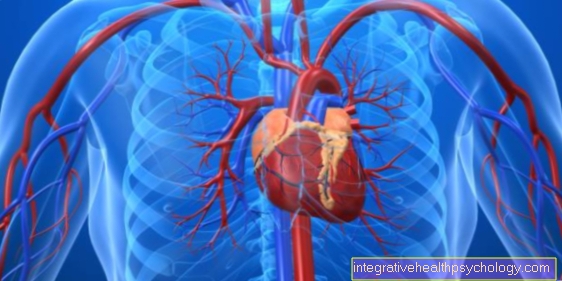
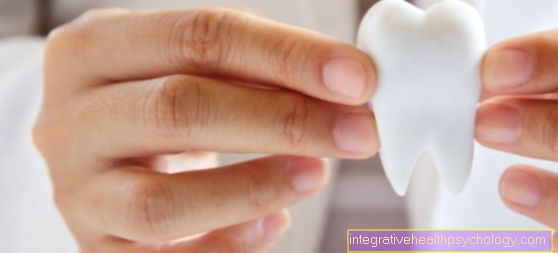


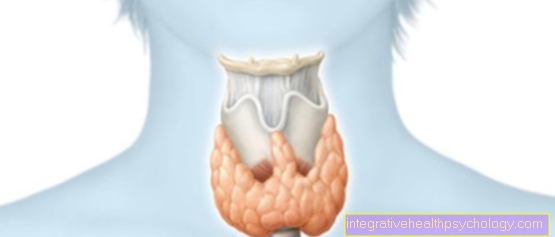






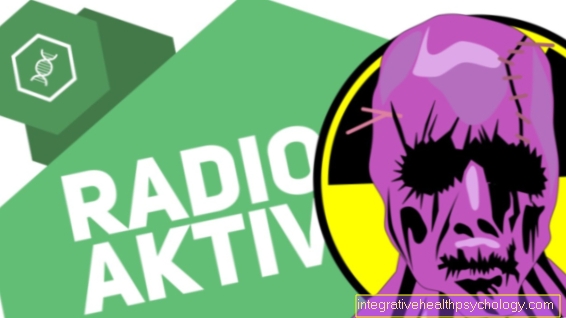

.jpg)




